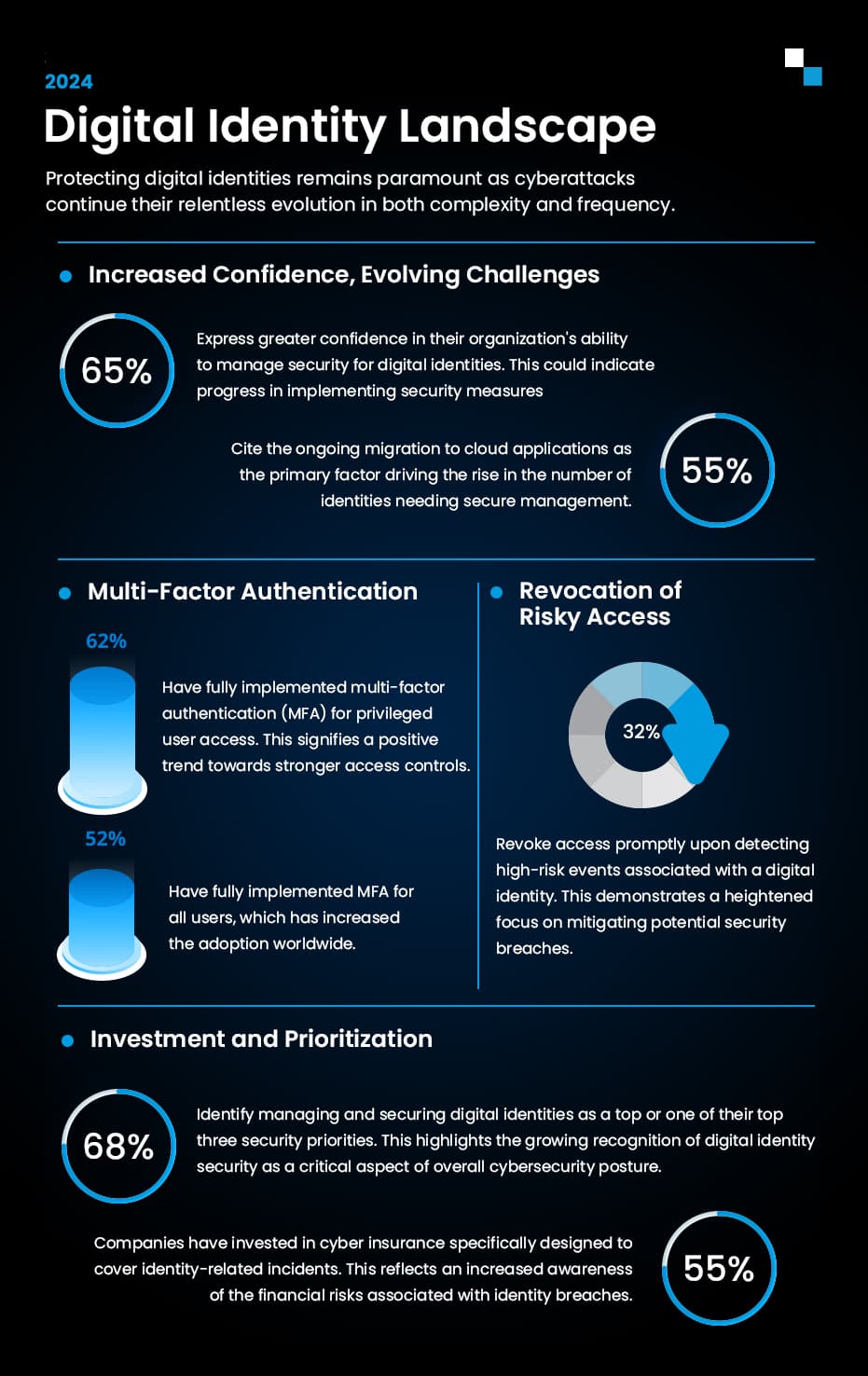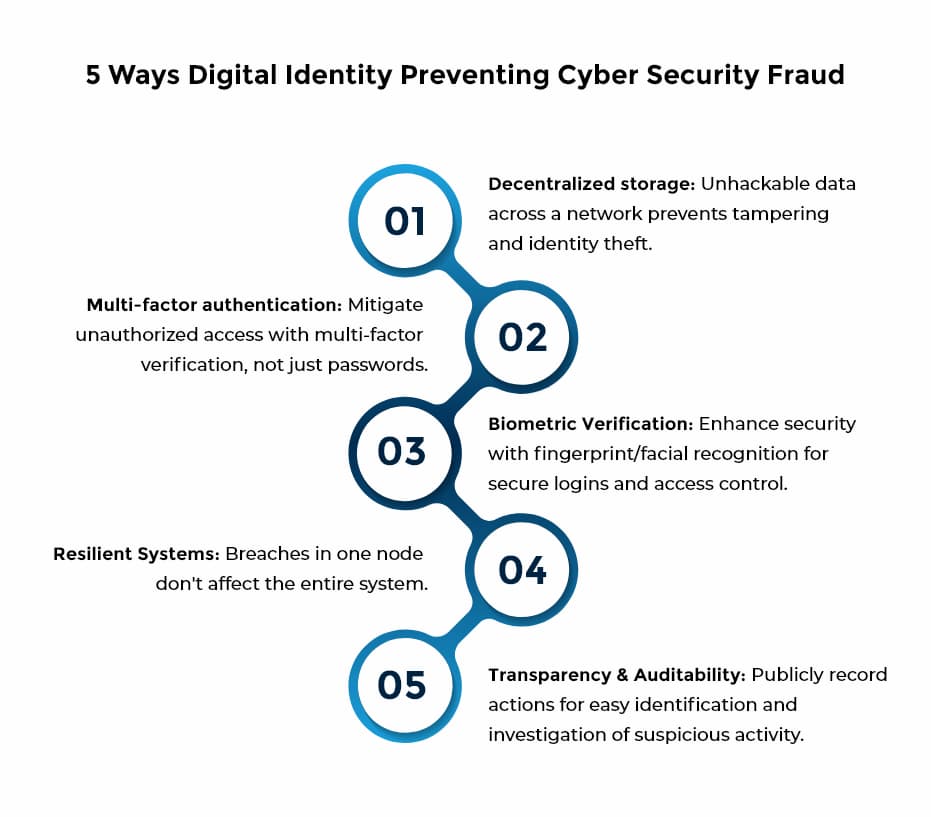In 2024, the digital world faces a cyber threat storm. Traditional identity management systems in cyber security are on the ropes. This article explores the critical clash: escalating cyberattacks versus the potential of blockchain-based digital identity solutions. Can these new technologies become our digital armor, overcoming vulnerabilities and building a more secure online future? Explore this dynamic interplay between security challenges and the exciting opportunities for trust in 2024.
Why Digital Identity Should Be a Top Priority for Cybersecurity Businesses in 2024?
The cybersecurity landscape is constantly evolving, and in 2024, blockchain identity management has become a critical battleground. However, there are various compelling reasons behind why digital identity platforms designed on leading blockchain must be a too priority for the cyber security businesses-

- Escalating Cyber Threats- Cybercriminals are becoming increasingly sophisticated, targeting user identities to gain access to sensitive information and systems. Traditional username/password combinations are easily compromised, highlighting the need for more robust identity verification methods.
- Data Breaches on the Rise- The number and size of data breaches are growing at an alarming rate. With more personal information stored online, attackers have a larger pool of data to exploit. Strong digital identity management protects this sensitive data by making it more difficult to steal or misuse.
- Compliance Requirements- Regulations like GDPR (Europe) and CCPA (California) are placing stricter emphasis on data privacy and user control. Digital identity solutions that empower users with control over their data are key to adhering to these evolving regulations.
- Evolving User Expectations- Modern users demand a seamless and secure online experience. Digital identity solutions that offer multi-factor authentication and biometric verification provide a more convenient and secure login process, meeting user expectations for robust security.
- The Rise of the Metaverse and Web3– As the virtual world expands with the Metaverse and Web3, secure and verifiable digital identities will be critical for user interaction and ownership of digital assets. Businesses that can provide these solutions will be well-positioned in this emerging market.

What are the challenges in the conventional identity systems of cyber security?
The digital landscape is booming, but so are cyber threats. Conventional identity management systems struggle to keep pace with the growing sophistication of attacks. Relying solely on passwords and usernames leaves businesses vulnerable to data breaches and fraud. In today’s interconnected world, we need a more secure and reliable way to verify user identities. Let us explore the challenges in the conventional identity management systems of cyber security to clearly understand the solutions designed for them-
- Centralized Authority~ Traditional identity management relies on centralized authorities to authenticate and manage digital identities, leading to single points of failure and susceptibility to cyberattacks.
- Data Vulnerability~ Storing sensitive personal information in centralized databases increases the risk of data breaches and compromises data privacy, exposing individuals to identity theft and fraud.
- Weak Authentication~ Conventional systems often employ weak authentication methods, making it easier for cybercriminals to exploit vulnerabilities and gain unauthorized access to digital identities.
- Interoperability Issues~ Lack of interoperability between different identity systems hinders seamless sharing of identity information across platforms and services, complicating identity verification processes and user experience.
Emerging Digital Identity Threats in Cyber Security
- Phishing and Social Engineering Tactics- Cybercriminals adept at social engineering exploit human psychology to compromise identities and gain access to sensitive data, posing a serious threat to digital identities.
- Rise of AI in Identity-based Attacks- Artificial Intelligence (AI) empowers cybercriminals to create fake identities, generate convincing phishing emails, and clone voices for nefarious purposes, elevating the risk to users’ sensitive data and financial assets.
- Advanced Persistent Threats (APTs)- APTs are prolonged cyber-attack campaigns where intruders infiltrate networks to access critical data, targeting digital identities, intellectual property, and critical infrastructures over an extended period.
- Cloud Storage Security- Attacks targeting cloud infrastructure pose a severe threat to digital identities, with attackers exploiting vulnerabilities to gain access to vital systems and stored data, exacerbated by inadequate access management and shared tenancies.
- Insider Threats- Often underestimated, insider threats pose significant risks as employees unintentionally or intentionally compromise security. Accidental threats include unwittingly providing authorization credentials through phishing emails, while intentional threats involve malicious users breaching networks for personal gain.
- IoT Attacks- The proliferation of IoT devices has facilitated cybercriminals’ infiltration of organizational networks, with attacks increasing by up to 20% in recent years. Even one unsecured endpoint can cause irreversible damage, especially as smaller IoT devices lack sufficient resources for proper anti-malware protection.
Blockchain technology presents a revolutionary solution. By leveraging its tamper-proof and decentralized nature, blockchain-based digital identity systems can significantly enhance security. In the next section, we will delve deeper into how digital ID solutions achieve this, exploring how they prevent fraud and empower users with greater control over their identities.
How Do Blockchain-Powered Digital Identity Platforms Prevent Cyber Security Frauds?
Cybercriminals often target vulnerabilities in traditional identity management systems to commit fraud. Here’s how blockchain-based digital identity solution disrupts these tactics and enhances cyber security:

1. Decentralized Storage
Imagine a vault with copies of your identity data scattered across the globe. That’s what blockchain offers. This decentralized storage makes stealing the entire dataset nearly impossible. Even if hackers breach one location (computer node), the rest of the network remains secure, safeguarding your identity information.
2. Multi-Factor Authentication
Passwords are easy to steal or guess. Digital identity management platform goes beyond passwords, implementing multi-factor authentication (MFA). This requires additional verification steps, like a unique code sent to your phone or a fingerprint scan. This extra layer of security significantly reduces the risk of unauthorized access to your identity, even if a hacker acquires your password.
3. Biometric Verification
Imagine using your fingerprint or face to unlock your online identity. This is the power of biometric verification integrated with blockchain! The robust digital identity platforms designed on premium blockchain adds another layer of security by requiring a unique biological identifier for access, making it much harder for someone to impersonate you using stolen credentials.
4. Resilient Systems
Traditional systems often have a single point of failure. If a central server is compromised, the entire system can be vulnerable. Blockchain-powered digital identity solutions avoid this by distributing data across a network. If a single computer (node) on the network is breached, the rest of the network remains secure. This ensures the overall system’s resilience against cyberattacks.
5. Transparency & Auditability
Blockchain acts like a public ledger, recording all transactions chronologically and tamper-proof. This transparency allows anyone to see the history of your identity’s access. If any suspicious activity occurs, it is easily identifiable and can be investigated quickly. This discourages fraudulent activity and fosters trust in the system.
Blockchain-powered digital identity platforms provide a major improvement in cyber security by incorporating these features. They give you more control and comfort in the digital world in addition to safeguarding your identity.
How Does Cyber Security Business Offer Benefits To Users By Leveraging Digital Identity Solutions?
Prioritizing digital identity solutions offers cybersecurity businesses significant benefits. Stronger verification methods reduce the risk of unauthorized access and fraudulent activity, enhancing overall security. Moreover, businesses demonstrating a commitment to user security through robust digital identity solutions can build trust and improve their brand reputation. In a competitive cybersecurity market, offering advanced digital identity solutions provides a clear competitive advantage.
As cyber threats evolve, regulations tighten, and user expectations for security increase, it’s evident that digital identity management should be a top priority for cybersecurity businesses in 2024. Businesses can not only secure the future of the online world but also foster trust and confidence among users by investing in innovative solutions.
What To Consider When Choosing A Blockchain Identity Management Company?
The world of blockchain digital identity management is growing rapidly. With numerous companies vying for your business, selecting the right blockchain identity management company can be overwhelming. Here are some crucial factors to consider when making your decision:
- Experience Matters- Look for a company with a proven track record and industry expertise in blockchain and identity management.
- Tech & Scalability- The technology should be secure, use a reputable blockchain platform, and seamlessly integrate with your existing systems.
- Compliance Counts- Ensure their solution aligns with data privacy regulations (like GDPR, and CCPA) to avoid future headaches.
- Security First- Robust security protocols with multi-factor authentication are essential to protect user data.
- Clear Communication- A partner that clearly explains their solutions and prioritizes ongoing collaboration is key.
Remember, focus on value over just cost. Consider partnering with an experienced and well-established blockchain identity management company boasting qualified experts. Make sure that the company offers the above-mentioned services to let you experience all the advantages of the blockchain journey.

The Final Thoughts
The ever-present threat of cyberattacks exploiting fake identities for fraud and data breaches necessitates robust digital identity management. As AI/ML, the IoT, and Advanced Persistent Threats continue to evolve, a crucial opportunity arises for enlisting digital identity services, The businesses can build online trust, secure digital communications, and stay ahead of the ever-changing cybersecurity landscape by leveraging blockchain-powered digital ID solutions.
Are you also planning to collaborate with a renowned blockchain identity management company to protect customer identities in your cyber security business? If yes, then you must get in touch with Antier, a leading blockchain development company that boasts qualified and experienced blockchain professionals who are well-versed in designing robust and relentless digital identity solutions for protecting, verifying, and managing your digital identities. Connect with our experts to discuss your upcoming business requirements.







